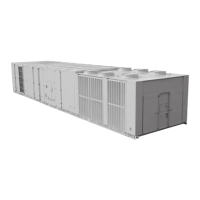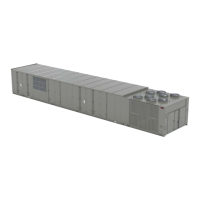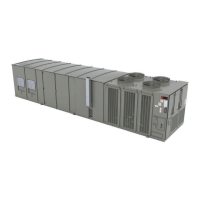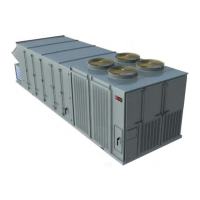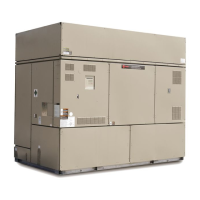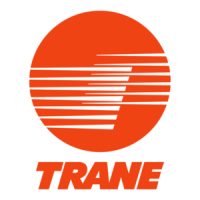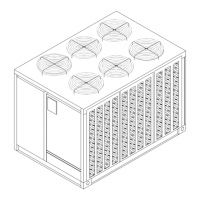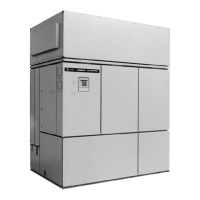Warnings, Cautions and Notices
RT-SVX36K-EN 3
Unit Nameplate
One Mylar unit nameplate is located on the outside upper
left corner of the control panel door. It includes the unit
model number, serial number, electrical characteristics,
weight, refrigerant charge, as well as to other pertinent
unit data. A small metal nameplate with the Model
Number, Serial Number, and Unit Weight is located just
above the Mylar nameplate, and a third nameplate is
located on the inside of the control panel door.
Compressor Nameplate
The Nameplate for the Scroll Compressor is located on the
compressor lower housing.
Max amps is listed on the nameplate and is the absolute
highest amp load on the compressor at any operating
condition (does not include locked rotor amps or inrush).
This value should never be exceeded.
Precautionary Measures
• Avoid breathing fiberglass dust.
• Use a NIOSH approved dust/mist respirator.
• Avoid contact with the skin or eyes.Wear long-sleeved,
loose-fitting clothing, gloves, and eye protection.
• Wash clothes separately from other clothing: rinse
washer thoroughly.
• Operations such as sawing, blowing, tear-out, and
spraying may generate fiber concentrations requiring
additional respiratory protection. Use the appropriate
NIOSH approved respiration in these situations.
First Aid Measures
Eye Contact - Flush eyes with water to remove dust. If
symptoms persist, seek medical attention.
Skin Contact - Wash affected areas gently with soap and
warm water after handling.
Revision Summary
RT-SVX36K-EN (04 Oct 2013)
• Added general information on “VZH Variable Speed
Compressors,” p. 18 and “High Compressor Pressure
Differential Protection,” p. 17
• Updated Table 22, p. 59 (Compressor electrical service
sizing data (20-130 ton)
• Updated Table 78, p. 175(Supply and Exhaust/Return
fanVFD programming parameters), with addition of 0-
06 (TR150 only) to Operation / Display Menu and 1-23
to Load and Motor Menu.
• Updated Supply Fan Performance Curve on Figure 66,
p. 109
• Updated Table 47, p. 118 for 50-59 ton data.
• Added information on “eFlex™ Compressor VFD
Programming Parameters,” p. 177
Overview of Manual
This booklet describes proper installation, start-up,
operation, and maintenance procedures for 20 through
130Ton rooftop air conditioners designed for Constant
Volume (CV), Single Zone VAV (SZVAV), and Variable Air
Volume (VAV) applications. By carefully reviewing the
information within this manual and following the
instructions, the risk of improper operation and/or
component damage will be minimized.
These units are equipped with electronic Unit Control
Modules (UCM) which provides operating functions that
are significantly different than conventional units. Refer to
the “Start-Up” and “Test Mode” procedures within this
Installation, Operation, & Maintenance manual and the
latest edition of the appropriate programming manual for
CV or VAV applications before attempting to operate or
service this equipment.
Note: The procedures discussed in this manual should
only be performed by qualified, experienced HVAC
technicians.
Note: One copy of the appropriate service literature ships
inside the control panel of each unit.
It is important that periodic maintenance be performed to
help assure trouble free operation. Should equipment
failure occur, contact a qualified service organization with
qualified, experienced HVAC technicians to properly
diagnose and repair this equipment.
Unit Inspection
As soon as the unit arrives at the job site
• Verify that the nameplate data matches the data on the
sales order and bill of lading (including electrical data).
• Verify that the power supply complies with the unit
nameplate specifications.
• Verify that the power supply complies with the electric
heater specifications on the unit nameplate.
• Visually inspect the exterior of the unit, including the
roof, for signs of shipping damage.
• Check for material shortages. Refer to the Component
Layout and Ship with Location illustration.
WARNING
Fiberglass Wool!
Product contains fiberglass wool. Disturbing the
insulation in this product during installation,
maintenance or repair will expose you to airborne
particles of glass wool fibers and ceramic fibers known
to the state of California to cause cancer through
inhalation. You MUST wear all necessary Personal
Protective Equipment (PPE) including gloves, eye
protection, mask, long sleeves and pants when
working with products containing fiberglass wool.
Exposition to glass wool fibers without all necessary
PPE equipment could result in cancer, respiratory, skin
or eye irritation, which could result in death or serious
injury.
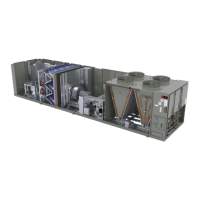
